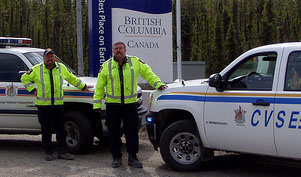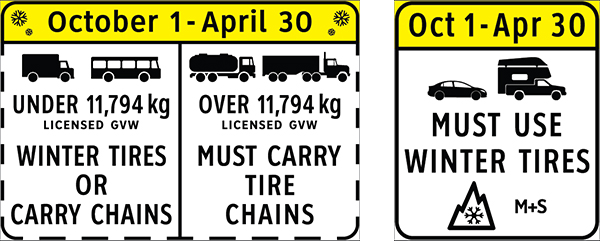Enforcement of Winter Tires & Chains Requirements
RCMP, Commercial Vehicle Safety and Enforcement (CVSE), and other policing agencies can prevent you from travelling and issue fines for not complying with signs and regulations that require you to properly equip your vehicle for road conditions.
Fines
-
Offence Act - Schedule 3 - Fines
- Motor Vehicle Act
- Section 125 applies when passenger vehicles are not equipped with winter tires when/where required - $121
- Section 208(4) applies when commercial vehicles bypass an active chain up area - $598
- Motor Vehicle Act Regulations
- Section 7.1635 applies when commercial vehicles are not carrying chains when/where required - $196
- Motor Vehicle Act
Drivers must obey winter tire and chain signs throughout the province from October 1 to April 30. For select highways not located through mountain passes and/or high snowfall areas, tire and chain requirements end March 31.
RCMP
The RCMP may turn all vehicles away if they think conditions are unsafe. DriveBC is an excellent source for highway conditions and weather forecasts.
Commercial Vehicle Safety and Enforcement (CVSE)
The B.C. Commercial Vehicle Safety and Enforcement program promotes compliance with safety regulations with the commercial transport sector. You will see them at road checks, patrolling B.C. highways and at weigh scale stations across the province year-round.
In winter, their focus is to ensure commercial vehicles comply with all safety regulations, especially the use of chains or traction devices. They may also issue tickets to private car, truck and motorcycle drivers.

Respect Local Bylaws
B.C. cities, municipalities and private roads (such as ski hills) may have their own bylaws or rules around the use of winter tires, chains or traction devices that may differ from provincial highway regulations.

